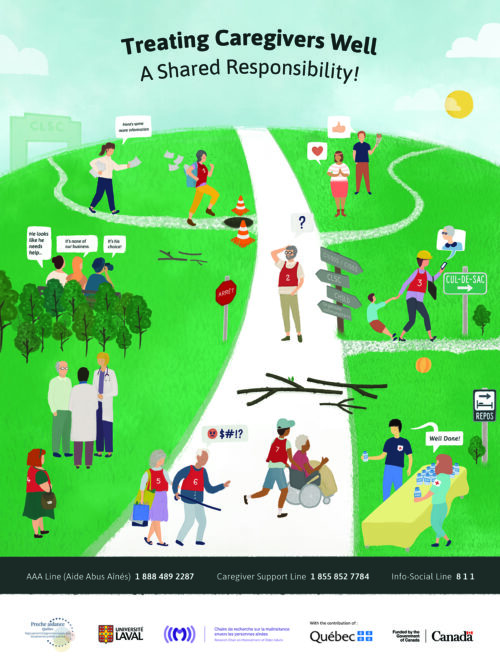According to Proche aidance Québec (https://procheaidance.quebec/recherche-maltraitance-proche-aidant/), “Treating caregivers well is a global support process. It is rooted in the social recognition of caregivers and public policies. Wellness care is the shared responsibility of institutions, the surroundings, assisted people and caregivers. It aims to promote the support of caregivers, listening to their needs, and valorising their contribution, their experience and their expertise in everyday life. By promoting positive and respectful attitudes and behaviours, wellness care can prevent mistreatment against them.” (Free translation)
ORIGIN AND EVOLUTION OF THE GUIDE
This facilitation guide was created as part of a research-action realised in partnership between the Regroupement des aidants naturels du Québec (RANQ), the researcher Sophie Éthier (University of Laval) and the co-researcher Marie Beaulieu (University of Sherbrooke and Research Chair on Mistreatment of Older Adults). This research brought together caregiving organisations, older adults organisations and caregivers, practitioners and researchers around the following goal: extend knowledge, raise awareness and prevent mistreatment towards caregivers.
433 caregivers and practitioners from 11 administrative region of Québec were mobilised. This guide was made possible thanks to the Government of Québec’s funding, through the program Québec ami des aînés (QADA).
AVAILABILITY OF THE TOOLS AND THE GUIDE
The research-action resulted in the creation of an awareness toolbox comprising of a poster, three brochures adapted to different audiences and narrated PowerPoint presentations. Instead of static material to distribute, thanks to this facilitation guide, we wanted to make these tools a stepping stone to open a discussion on an issue that is still taboo, but none the less real.
Brochure for practitioners and health and social services professionals (FR)
Brochure for practitioners and health and social services professionals (ENG)
Proche aidance Québec has obtain new funding to further develop and distribute the toolbox, we invite you to consult the organization’s website to learn more : https://procheaidance.quebec/bientraitance/
Éthier, S., Beaulieu, M., Perroux, M., Andrianova, A., Fortier, M., Boisclair, F., Guay, M.-C., Guilbeault, C. & Côté, J. (2021). Treating Caregivers Well A Shared Responsibility! Facilitation guide for an awareness workshop on the mistreatment of caregivers for caseworkers and healthcare providers. Quebec : Regroupement des aidants naturels du Québec. 48 p.
